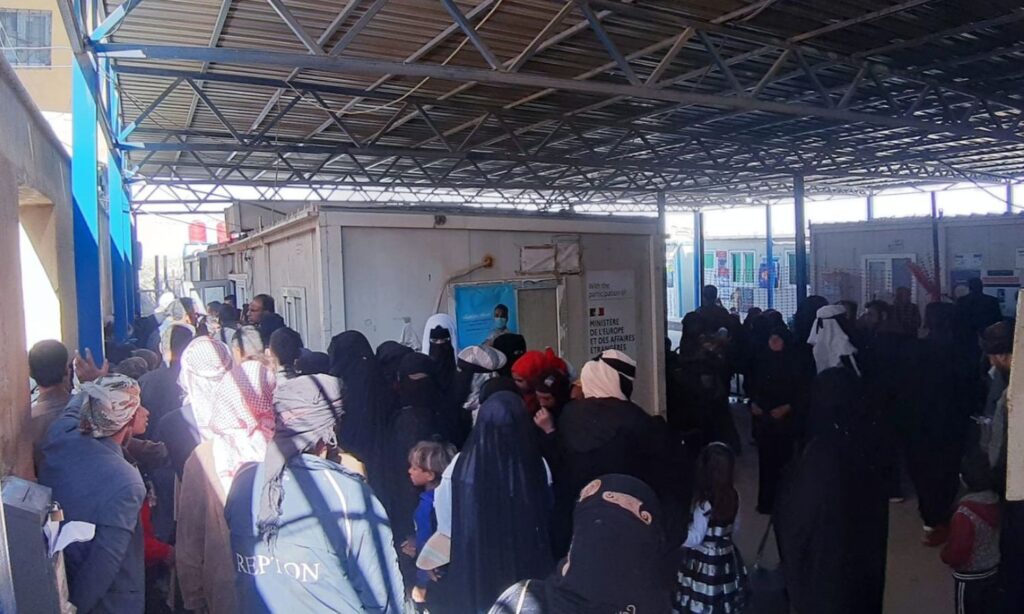Deir Ezzor – Obadah al-Sheikh
COVID-19 has re-emerged in the eastern countryside of Deir Ezzor, under the control of the Autonomous Administration of North and East Syria (AANES), according to diagnoses by healthcare workers in the region, amidst the near-total absence of medical services compounded by the deteriorating security situation.
Despite most countries having managed to overcome the risks of COVID-19 during the past two years, and with infections now sometimes no different than common colds due to the spread of vaccines, these risks still persist in eastern Deir Ezzor, where the area’s residents bear the financial burden of treatment within the difficult economic conditions prevailing in Syria.
Twenty-eight-year-old Kawkab al-Abdullah told Enab Baladi that her sister has been infected with COVID-19 for some time and does not have many options to alleviate the virus’s effects, as the treatment costs are high, while public hospitals do not provide any services or medications.
She added that the medications she searched for during the past period were not available at the hospital pharmacy, forcing her to pay around 150,000 Syrian pounds for a set of medications regularly.
The exchange rate of the US dollar surpassed 14,500 Syrian pounds, according to the S-P Today website, which specializes in foreign currency exchange rates.
Lack of medical resources
A physician employed at the Al-Kasrah Hospital, affiliated with the Autonomous Administration in the western countryside of Deir Ezzor, informed Enab Baladi that the hospital receives COVID-19 cases, but the available medical resources are weak, and doctors diagnose cases based on symptoms due to the lack of medical testing equipment.
The physician, who preferred to remain anonymous as he does not have permission to speak to the media, added that many cases were admitted to Al-Kasrah Hospital and diagnosed based on symptoms, while doctors only wrote medical prescriptions due to the unavailability of treatment within public hospitals as well.
According to the physician, the hospital administration has repeatedly requested the Health Committee affiliated with the Autonomous Administration to provide testing equipment and COVID-19 vaccines but has received no response to date.
General shortage of medical supplies
Dr. Bakr al-Sayyid Ahbash, an internal medicine specialist working at his private clinic in the town of al-Saewa in western Deir Ezzor, stated that hospitals and health centers do not provide treatment for some cases due to the unavailability of their specific medications.
He added that the region suffers from a shortage of medications and medical equipment in general due to the lack of funding, leading ultimately to the loss of several medical personnel.
Ahbash had previously mentioned to Enab Baladi that the total number of doctors working in various specialties in the western countryside of Deir Ezzor reached 250 registered doctors with the Autonomous Administration.
He explained that the region not only suffers from a lack of personnel and equipment but also faces a shortage of medications, in addition to problems in some medical laboratories due to the unavailability of testing swabs for virus detection.
The doctor stated that he oversees cases of individuals infected with COVID-19 in the western countryside of Deir Ezzor, some of whom have begun to recover after receiving treatment and home quarantine.
He added that monitoring cases at home has become the only solution to mitigate the virus spread in the area where medical facilities are scarce.
Turning to pharmacists
Suleiman, a pharmacist in the city of al-Busayrah in the eastern countryside of Deir Ezzor, who preferred to withhold his full name for security reasons, told Enab Baladi that the virus has recently spread to a limited extent among the area’s residents, in addition to severe influenza cases requiring multiple prescriptions beyond those for regular flu.
He added that the prevalent treatment for those infected with influenza or COVID-19 in the area is administered through intravenous antibiotic injections, while no COVID-19 vaccines are available in the region.
He noted that some cases may require ten intermittent injections of anti-inflammatory agents in addition to fever-reducing medications.
During the COVID-19 pandemic that swept through the world between 2020 and 2021, the eastern countryside of Deir Ezzor was almost devoid of active health centers, according to activists from the area who spoke to Enab Baladi at the time, and assistance for the infected was limited to volunteer teams or personal efforts by some residents.

